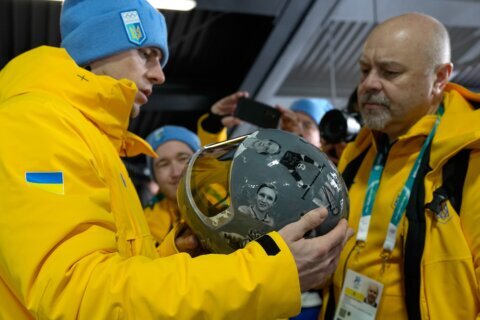BRADLEY BROOKS
Associated Press
RIO DE JANEIRO (AP) — A World Cup hospitality company director has been declared a fugitive by Brazilian police investigating a ticket scalping scheme.
Police have told The Associated Press the probe is set to expand to include FIFA and domestic football officials.
Investigator Fabio Barucke said Ray Whelan left the lavish Copacabana Palace through a service entry on Thursday about an hour before police arrived to re-arrest him.
Police accuse Whelan as being a main source of World Cup tickets that were sold to an Algerian national they label as the biggest scalper of tickets for the sport’s marquee tournament.
“He’s now considered a fugitive,” Barucke said outside the hotel. “We have security camera images of him exiting the hotel through a service door.”
Barucke told the AP in an exclusive interview late Wednesday night that police have 50,000 tapped phone calls made between suspected scalpers in Rio alone, beginning about four weeks before the World Cup began on June 12.
That figure included an estimated 900 calls between Whelan and Algerian national Lamine Fofana since the tournament kicked off.
Barucke said that virtually all of those calls referred to the sale of tickets in one form or another, the pair often arranging to meet at the Copacabana Palace where many FIFA officials are based.
“Raymond knew that Fofana was a scalper, he knew that he was going to resell those tickets on the black market,” Barucke said.
The investigator says he’ll soon receive several weeks’ worth of security camera tapes from inside the Copacabana Palace, which he said investigators already know was “a bazaar of tickets, it was a market for scalping.”
He said he’s confident his investigation will reveal that FIFA officials and authorities from Brazil’s national football confederation also funneled tickets to known scalpers, in return for a share of the illegal profits.
Fofana, Barucke said, was often spotted inside the hotel, “so we began to monitor his network inside of the Copacabana Palace, which is how we discovered that (Whelan) was a source of tickets for him.”
In an earlier detailed statement, the MATCH group denied any wrongdoing by Whelan, and said he was willing to cooperate with any investigation, confident that it would exonerate him of any wrongdoing.
Under Brazilian law, selling tickets for sporting events above face value is illegal. But it’s a crime that normally results in a fine of about $225 and no prison sentence.
However, Barucke said he has formally requested that a judge consider the actions of Whelan and at least 11 others already arrested in the alleged scalping scheme of having formed a criminal conspiracy — which could result in significant jail time.
That would “give a shot of adrenaline” to the police investigation, Barucke said.
The MATCH group, which owns rights to sell World Cup hospitality packages, has acknowledged that Whelan and Fofana discussed cash sales of final tickets for $25,000 in telephone calls wiretapped by Rio de Janeiro police — but say those were packages that included not just tickets but VIP services, hence the high price.
In a Thursday statement, Jaime Byrom, the executive chairman of MATCH Services and MATCH Hospitality, said that “notwithstanding our belief that the action taken against Mr. Whelan was illegal and baseless, MATCH Services and I personally remain totally committed to assist the authorities.”
Earlier this week, MATCH challenged police to justify the “arbitrary and illegal” arrest of Whelan, a director of MATCH’s accommodation service. He is a brother-in-law of company founders Jaime and Enrique Byrom.
On Monday, Whelan was detained at the Copacabana Palace by police who seized tickets for World Cup matches. He was released early Tuesday.
Brazil’s Sports Minister Aldo Rebelo, asked at FIFA briefing on Thursday if he was insulted by MATCH’s statements implying police in Rio didn’t understand the ticketing business and had performed an illegal arrest, said that there was nothing to indicate “police acted on the margins, or above and beyond the law.”
“The judiciary has the role to correct any problems following the rule of law,” he said. “So I don’t know why this company says that the police performed an illegal act.”
___
Associated Press writer Graham Dunbar contributed to this story.
___
Follow Bradley Brooks on Twitter: www.twitter.com/bradleybrooks
Copyright 2014 The Associated Press. All rights reserved. This material may not be published, broadcast, rewritten or redistributed.







